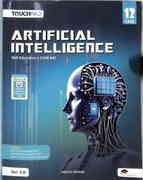Professional Courses
Industry-relevant training in Business, Technology, and Design
Categories
Interactive Games
Fun games to boost memory, math, typing, and English skills
Typing
Memory
Math
English Adventures
Knowledge

CBSE 12 AI (Artificial Intelligence)
Evaluating AI models is crucial for understanding their performance in real-world scenarios, including checking predictions, error rates, and ensuring fairness. Various methodologies such as confusion matrices, evaluation metrics, cross-validation, and ROC curves provide frameworks to assess model quality. These techniques not only help in selecting the best-performing models but also address issues of bias and fairness in AI applications.
12 Chapters
12 weeks
You've not yet enrolled in this course. Please enroll to listen to audio lessons, classroom
podcasts and take practice test.
Course Chapters
Chapter 1
Communication Skills – IV
Chapter 2
Self-Management Skills – IV
Chapter 3
Information and Communication
Chapter 4
Entrepreneurial Skills – IV
Chapter 5
Green Skills – IV
Chapter 6
Introduction to Artificial Intelligence
Chapter 7
AI Project Cycle
Chapter 8
Advanced Python – Revision and Functions
Chapter 9
Data Analysis using Python
Chapter 10
Introduction to Neural Networks
Chapter 11
Natural Language Processing (NLP)
Chapter 12
